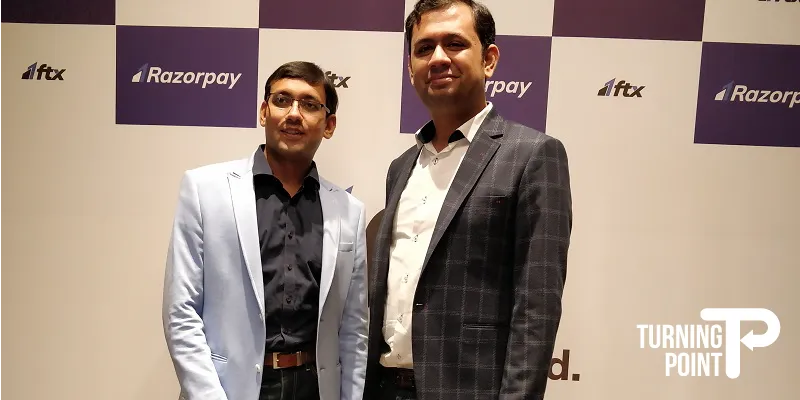[The Turning Point] How Razorpay founders made online payments simpler for startups, SMEs
The Turning Point is a series of short articles that focuses on the moment when an entrepreneur hit upon their winning idea. Today, we take a look at Razorpay, which is one of the first payment gateways in India.
With the growth of ecommerce in India, the only stumbling block until recently was the way consumers paid for their purchase. To make the payment process simple for startups and SMEs, Harshil Mathur and Shashank Kumar started Razorpay in 2014.
With no background in finance, the duo decided to build a payment gateway after they realised the existing online payment systems were long and tedious.
The idea was simple - get a payment gateway integration for startups and merchants within 15 minutes. The existing systems needed a lot of paperwork and took close to a month to integrate.

Shashank Kumar and Harshil Mathur
Fast forward to today, Razorpay has a wide spectrum of paying customers. It caters to more than 350,000 merchants, including the likes of startup unicorns such as OYO, Zomato, and Swiggy, and large enterprises like Airtel and the state-run IRCTC.
It processes transactions to the tune of $5 billion annually, on-boarding over 5,000 business using its platform for payments every day. In terms of market share, the company commands more than 12 percent of the Indian payments domain at present, up from the two percent market share a year ago.
But Razorpay in its current avatar has gone through multiple changes and challenges. It initially started as a school-fees management platform in Jaipur. Unfortunately, there were not many takers for the product.
“We pitched to several schools, but they were not aware of the benefits of digital payments,” says Harshil.
It was during this time they happened to talk to startups and SMEs at the coworking space they were at, and realised the challenges of online payment integration.
To understand the need, Harshil says they contacted a few payment gateway companies.
“We were asked for past operational records, presence of physical offices, security deposits, and high set-up fees. The online reviews of most payment gateways in India confirmed similar bad experiences. And thus, the idea of Razorpay got seeded,” says Harshil.
“Typically, payment integration needs several pages of documents and other paperwork. We kept it simple by integrating one line of code on the frontend and one line of code on the backend. It made the job easy. Our integration takes half an hour," says Shashank.
It also took them meetings with about 80 bankers before they found someone who could help them build the product. The duo would ride their motorbike around Jaipur to sell the product to companies for the first three to four months.
However, one meeting with a Jaipur bank turned it all around. Harshil recalls, “The bank took a lot of time to put me in contact with the right person. When I finally got in touch with him, I explained our product over a phone call and how we did not want to integrate the platform for ourselves, but for our merchants and other banks’ gateways. The Delhi branch had already worked on similar payments concepts and therefore it was relatively easy for him to understand what we were trying to achieve.”
This article is part of a series that highlights the turning point in a startup founder’s entrepreneurial journey.
(Edited by Megha Reddy)


![[The Turning Point] How Razorpay founders made online payments simpler for startups, SMEs](https://images.yourstory.com/cs/2/79900dd0-d913-11e8-a160-45a90309d734/Razorpay_-TP1565593000608.png?mode=crop&crop=faces&ar=2%3A1&format=auto&w=1920&q=75)
![[Techie Tuesday] How Razorpay’s Shashank Kumar built India’s first online payment gateway for s...](https://images.yourstory.com/cs/2/730b5070-2d6c-11e9-aa97-9329348d4c3e/Shashank_Kumar_TechieTuesday-011564425520224.png?fm=png&auto=format&h=100&w=100&crop=entropy&fit=crop)





